
Dedicated to the memory of
Art Arthur and Jerry Hauge
Still for Cookie
CONTENTS
Its been more than twenty years since the first edition of Writing Screenplays That Sell was published. In that time its sold about 75,000 copiesnot J. K. Rowling territory, but not bad. I like to think each of those 75,000 people read it and then passed it on to somebody else, making the total closer to 150,000. But thats probably not realistic, so lets just stick with 75,000.
If you are one of those people who liked the earlier edition, I first want to say thank you, for making this book one of the most rewarding experiences of my life. Thanks for all the letters and e-mails telling me it made you want to be a screenwriter, or that it helped you write your script. Thanks to all of you who have approached me at writers conferences or lectures or book signings to tell me how it was the first book on screenwriting you ever read, or that its still your favorite, or that it inspired you to go after your dream, or that it helped you break into screenwriting, or that it helped you get your script produced.
I also want to reply to the question youre no doubt asking: Since I already read the first edition, should I buy this one as well?
My answer is yes.
Its a self-serving answer, I know. But heres why I think its a good idea:
 In this new edition, I use as examples more than a hundred new movies released in the last twenty years.
In this new edition, I use as examples more than a hundred new movies released in the last twenty years.
 I also chose a new screenplayAvatarto analyze in detail, along with new scripts to illustrate character categories, character growth, and theme, and charting your screenplay.
I also chose a new screenplayAvatarto analyze in detail, along with new scripts to illustrate character categories, character growth, and theme, and charting your screenplay.
 Ive expanded the section on structure to include a lot more about the opening and setup of your script, the end of your script, and the use of such structural principles as anticipation, credibility, time, and powerful endings.
Ive expanded the section on structure to include a lot more about the opening and setup of your script, the end of your script, and the use of such structural principles as anticipation, credibility, time, and powerful endings.
 Ive added an entire chapter on exceptions to the rules, to examine successful screenplays that dont follow the traditional Hollywood model.
Ive added an entire chapter on exceptions to the rules, to examine successful screenplays that dont follow the traditional Hollywood model.
 When I originally wrote the book, no one used the Internet. Now everyone does, so I identify a bunch of invaluable Web sites for marketing your screenplay.
When I originally wrote the book, no one used the Internet. Now everyone does, so I identify a bunch of invaluable Web sites for marketing your screenplay.
 I reexamined every single principle for writing and selling screenplays to make certain it was still appropriate in todays marketplace, adding new ideas and approaches that come from twenty more years of experience as a Hollywood script consultant and teacher.
I reexamined every single principle for writing and selling screenplays to make certain it was still appropriate in todays marketplace, adding new ideas and approaches that come from twenty more years of experience as a Hollywood script consultant and teacher.
But perhaps most of all, I think its a good idea to revisit all these concepts you know, and many you dont (or might have forgotten), to reinforce your good writing habits, to get rid of any bad ones youve developed, and to get reinspired to go after your screenwriting dreams.
T HERE ARE ALSO A FEW THINGS I DECIDED NOT TO CHANGE. THE first is the original introduction, which Ive left more or less intact, starting on page xxv. I still like what I wrote twenty years ago. And its all still true.
If you want to be a screenwriter, youll still encounter lots of people wholl try to discourage you from your dream, and wholl tell you its dumb or impossible. And the only way to overcome that is still to ignore them, stay with your passion, and hit the keyboard.
Technology may have improved, and the markets for your work may have changed a bit, but the principles of good storytelling have not. And the fact that Hollywood is desperate for good screenwriters is as true as ever.
I also kept some of the examples from the first edition, because they were just too good at illustrating the principles of great screenwriting to omit.
And I hope Ive kept whatever clarity or simplicity or insight or humor or passion or whatever it was in the first edition that seemed to enlighten and inspire people.
This is where those of you who are brand-new readers come in.
I have been very blessed, and am very grateful, that this book has been helpful enough, and has meant enough, to writers and filmmakers and agents and development executives that it has stayed on the shelves for twenty-plus years. I hope you will find it as beneficial to your craft and to your screenwriting career.
Enjoy.
Screenplays became, in the last half of the twentieth century, what the Great American Novel was for the first half. Closet writers who used to dream of the glory of getting into print now dream of seeing their story on the big or small screen.
That dream is by no means confined to Hollywood. People everywhere watch TV and think to themselves, I could write better than that. Or they go to the movies, and they want to be a part of that magic or that glamour or that wealth that they see and read about. Or they just want to touch the pain and the wonder that comes from filling a blank page with something totally their own.
So they decide to give it a shot. And then they meet The Great Destroyers: Everybodys writing a screenplay. You cant learn creativity. Its impossible to get an agent. Youve got to live in southern California. Its who you know, not what you know. Theyll rip you off. Theyll ruin your script. Nobody knows what sells. All they want are teenage sex comedies. All they want is macho violence. All they want are established writers.
And you dont have any talent anyway.
So the dream gets changed or diminished or vanishes altogether. Or those writers forge ahead in blind, confused ignorance, assuming that there are no standards in Hollywood, that its just a crapshoot. Or they refuse to consider commerciality at all, because thats a sellout. Or they decide just to go after the bucks because you cant hope to say anything meaningful anyway. And so on.
I dont buy it. After working in Hollywood developing screenplays as a reader, a story editor, staff producer, and consultant for countless writers and production companies, and after listening to, talking with, working with, and interviewing writers, agents, producers, executives, and movie stars, I think all those notions listed above are myths. At the very least, they have grown way out of proportion to reality and need to be put in proper perspective.
The goal of this book is to destroy those common myths of failure and to replace them with the following ideas:
If screenwriting is a goal you wish to pursue, then you should go for it. And as long as you find the process of writing screenplays personally fulfilling, then you should keep at it, because anyone with talent who sticks around long enough will succeed.
Lots of us would like to have written a screenplay; whats important is whether you want to write a screenplay. If you get fulfillment out of the day-to-day work of putting a story to paper, then the additional rewards of money and success and fame can follow. But if its those secondary rewards youre focused on, it probably wont happen, and success certainly wont be as golden as you think it will be if it does arrive.
Creativity is something we all possess. Your objective should be not to learn creativity but to stimulate it. This book is filled with methods of nudging, nurturing, and recognizing your own creativity, and funneling it into your screenplay.
Next page
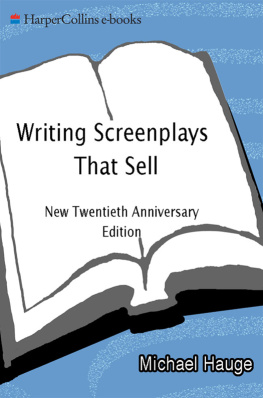
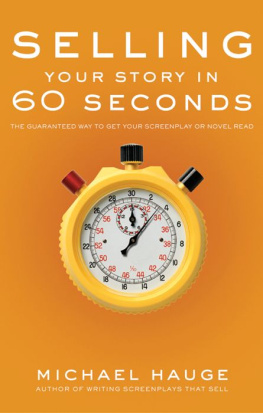
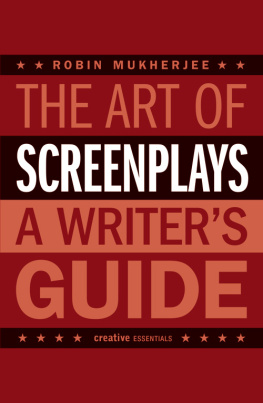
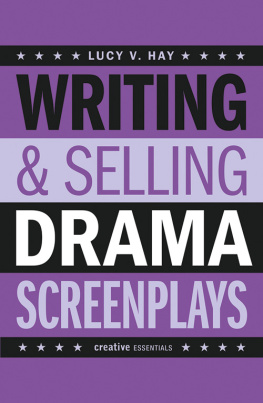
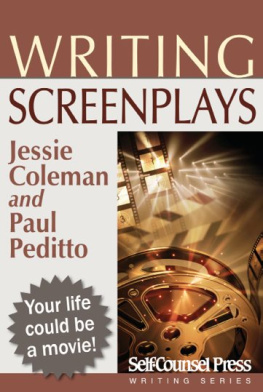
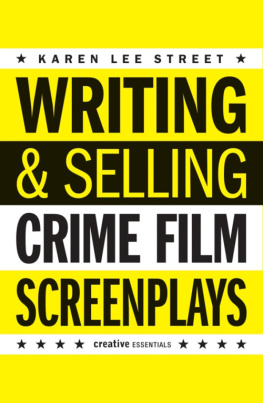
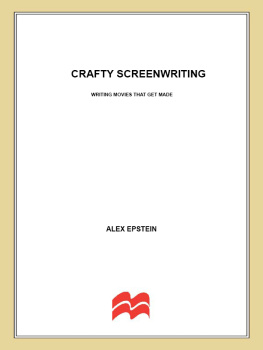
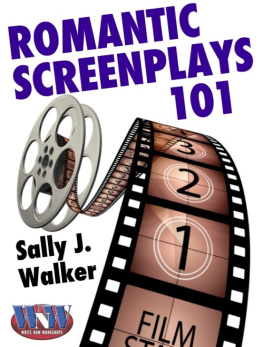
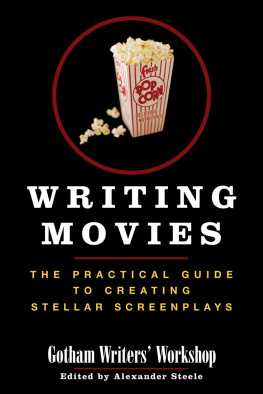
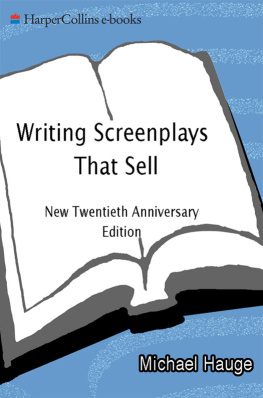
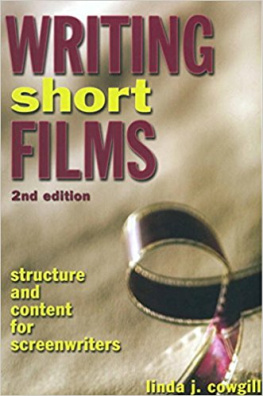



 In this new edition, I use as examples more than a hundred new movies released in the last twenty years.
In this new edition, I use as examples more than a hundred new movies released in the last twenty years.